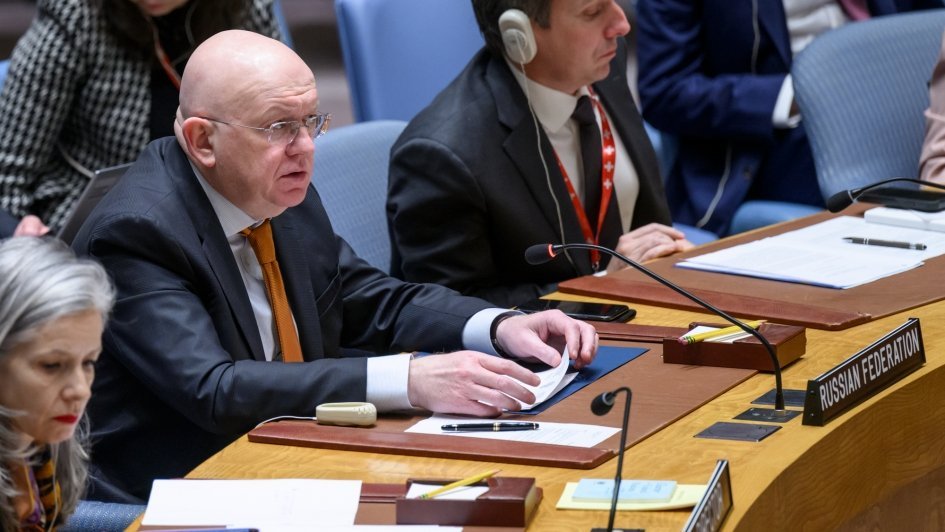New York, 1 April 2023 (TDI): Vasily Nebenzya, Russia’s Permanent Representative to the United Nations, participated in a UN Security Council debate on the role of development policies in implementing the Silencing the Guns Initiative in Africa.
Vassily Nebenzia stated that Russia has strongly supported the Mozambican Presidency in its recent meeting regarding the impact of socioeconomic issues on peace and security in Africa.
Russia has stressed the need to address the core causes of conflicts on the continent, originating from previous colonialism, slavery, and resource pillaging.
#Nebenzia: Russia🇷🇺 engages continuously to help African states develop anti-crisis potentials of their own. One of our tracks of cooperation is formation of efficient armed forces & law enforcement, i.a. with a view to countering the #terrorist threat. https://t.co/AjEdU8gFDX pic.twitter.com/MeXCzyQkFI
— Russia at the United Nations (@RussiaUN) March 30, 2023
Nebenzia asserted that the country recognizes that the 1960s decolonization processes did not always lead to newly independent governments gaining full economic and political autonomy.
Additionally, he stated that neocolonialism has contributed to economic underdevelopment, poverty, and political instability in African countries.
Several African countries have been subjected to unilateral restrictions and sanctions, resulting in new and intensifying crises.
He shared that Russia believes establishing long-term peace requires a comprehensive strategy involving both a political process and development measures.
The nation considers it crucial to assist African countries by exchanging technology and expertise, fostering the growth of businesses and agriculture, rehabilitating infrastructure, and providing social protection.
Activities in the area of effect should promote social unity and ensure a just distribution of economic profits.
Also Read: South Africa, Russia committed to strengthening bilateral ties & economic cooperation
According to Nebenzia, wealthy nations are morally obligated to help African states with material and technical needs. Developed nations must fulfill their 50-year-old pledge to increase development assistance to 0.7% of GDP.
He also pointed out that it will only be 0.33% in 2021, implying that underdeveloped countries will require at least $200 billion more in free help each year.
According to him, Russia thinks that international assistance should be delivered only with the host government’s approval, under its priorities, and regarding national sovereignty.
Donors should not condition assistance on political demands or tie it to the state of human rights or other arbitrary variables.
He stated that Russia believes African states are primarily responsible for conflict prevention and resolution. In recent decades, Africa has come a long way in establishing a regional peace and security architecture.
Russia appreciates the African Union and sub-regional organizations’ growing role in preventing and resolving disputes and conflicts.
Nebenzia stressed the importance of adopting a plan to follow up on the flagship AU project on gun control in Africa. He reaffirmed that Russia ensures African peace and security while assisting African states in developing their anti-crisis capacity.
The country offers state-sponsored funding for free training in medicine, education, high technology, transportation, and other civilian occupations to Africans.
It also fosters collaboration in healthcare, assuring biological and epidemic safety and other areas critical to the African region.
Russian Representative claimed that Russia aids African states through UN Development System mechanisms such as WFP, WHO, UNIDO, UNDP, and FAO.
It also contributes to reducing Africa’s debt burden, having written off more than $20 billion in African debt as part of the Debt Relief Initiative for Highly Indebted Poor Countries.
He noted that Russia would debate its future collaboration with Africa at the second Russia-Africa Summit, which will be held in St. Petersburg on July 26-29.
The Summit’s tagline, “For peace, security, and development,” underlines Russia’s commitment to helping to normalize the situation on the African continent.
The draft Action Plan for cooperation between the Russian Federation and the African Union (AU) for 2023-2025, which is expected to be endorsed during the summit, includes joint work on the African Union’s flagship program on gun control in Africa by 2030.






